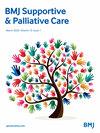Evaluation of a nature-based virtual reality intervention to support hospice caregivers: a pilot feasibility study
IF 2
4区 医学
Q3 HEALTH CARE SCIENCES & SERVICES
引用次数: 0
Abstract
Objectives Hospice family caregivers (CGs) may experience poor emotional health and diminished quality of life (QOL) secondary to stressors that accompany home-based end-of-life caregiving. Innovative flexible strategies are needed to support hospice CGs in their homes. Being outdoors in nature enhances well-being but is often not accessible to home-based CGs. The purpose was to evaluate the feasibility/acceptability, and preliminary emotional health and QOL outcomes of a 5-day nature-based virtual reality (VR) intervention. Methods A pre–post design was used. Hospice CGs engaged in self-selected 10 min nature experiences via VR headset over 5 days. Preintervention surveys included demographics and the PROMIS-29 QOL measure (physical/social function, anxiety/depressive symptoms, fatigue, sleep and pain). Postintervention surveys included acceptability/feasibility surveys, PROMIS-29 and a VR-related symptom checklist. Data analysis included descriptives and paired t-tests. Results 15 CGs (mean 61.13±12.47 years; 12 females) completed the study. Findings demonstrated high acceptability (14.46±1.77; range 0–16); feasibility (13.93±2.43;range 0–16). Adverse VR symptoms were minimal. PROMIS-29 overall scores were significantly improved following the 5-day intervention (pre: 66.33±8.47; post: 61.07±7.83,p=0.01). Paired t-tests showed significant pre–post changes in anxiety (t=2.206, p<0.05) and favourable trends on other QOL dimensions. Conclusions Feasibility/acceptability and QOL data support further testing of VR nature immersive experiences in the home environment with larger more diverse representative samples.评估基于自然的虚拟现实干预,以支持临终关怀护理人员:试点可行性研究
目标 临终关怀家庭照护者(CGs)可能会因家庭临终关怀所带来的压力而导致情绪不佳和生活质量(QOL)下降。我们需要创新灵活的策略来支持居家安宁疗护的临终关怀者。在大自然中进行户外活动可以提高身心健康,但居家临终关怀人员往往无法做到这一点。目的是评估为期 5 天的基于自然的虚拟现实(VR)干预的可行性/可接受性以及初步的情绪健康和 QOL 结果。方法 采用前后期设计。安宁疗护 CG 在 5 天内通过 VR 头显进行自我选择的 10 分钟自然体验。干预前调查包括人口统计学和 PROMIS-29 QOL 测量(身体/社会功能、焦虑/抑郁症状、疲劳、睡眠和疼痛)。干预后调查包括可接受性/可行性调查、PROMIS-29 和 VR 相关症状检查表。数据分析包括描述性分析和配对 t 检验。结果 15 名 CG(平均 61.13±12.47 岁;12 名女性)完成了研究。研究结果表明可接受性高(14.46±1.77;范围 0-16);可行性高(13.93±2.43;范围 0-16)。VR 不良症状极少。为期 5 天的干预后,PROMIS-29 总分有了明显提高(干预前:66.33±8.47;干预后:61.07±7.83,p=0.01)。配对 t 检验显示,焦虑在干预前和干预后都有明显变化(t=2.206,p<0.05),其他 QOL 维度也呈现良好趋势。结论 可行性/可接受性和 QOL 数据支持在更大范围、更具多样性的代表性样本中进一步测试家庭环境中的 VR 沉浸式自然体验。
本文章由计算机程序翻译,如有差异,请以英文原文为准。
求助全文
约1分钟内获得全文
求助全文
来源期刊

BMJ Supportive & Palliative Care
Medicine-Medicine (miscellaneous)
CiteScore
4.60
自引率
7.40%
发文量
170
期刊介绍:
Published quarterly in print and continuously online, BMJ Supportive & Palliative Care aims to connect many disciplines and specialties throughout the world by providing high quality, clinically relevant research, reviews, comment, information and news of international importance.
We hold an inclusive view of supportive and palliative care research and we are able to call on expertise to critique the whole range of methodologies within the subject, including those working in transitional research, clinical trials, epidemiology, behavioural sciences, ethics and health service research. Articles with relevance to clinical practice and clinical service development will be considered for publication.
In an international context, many different categories of clinician and healthcare workers do clinical work associated with palliative medicine, specialist or generalist palliative care, supportive care, psychosocial-oncology and end of life care. We wish to engage many specialties, not only those traditionally associated with supportive and palliative care. We hope to extend the readership to doctors, nurses, other healthcare workers and researchers in medical and surgical specialties, including but not limited to cardiology, gastroenterology, geriatrics, neurology, oncology, paediatrics, primary care, psychiatry, psychology, renal medicine, respiratory medicine.
 求助内容:
求助内容: 应助结果提醒方式:
应助结果提醒方式:


